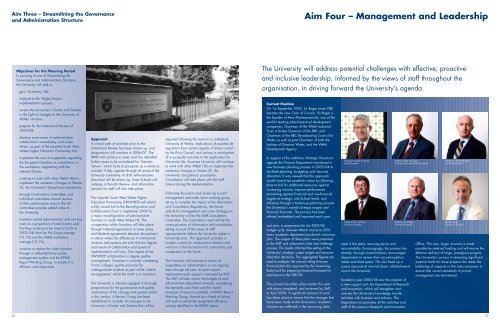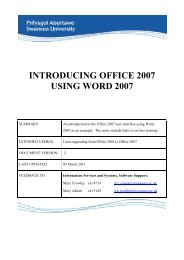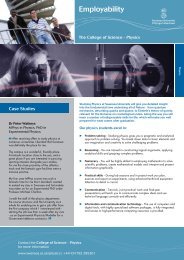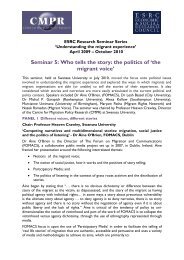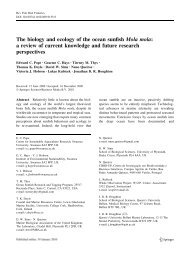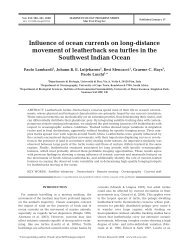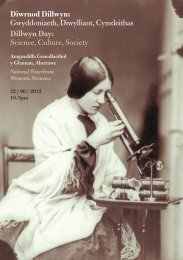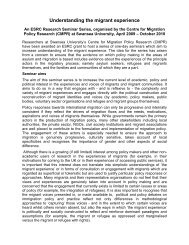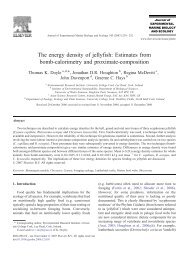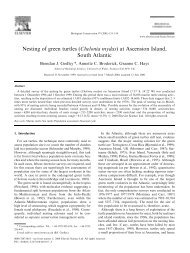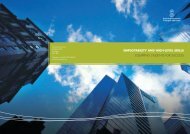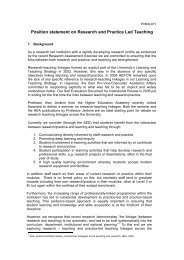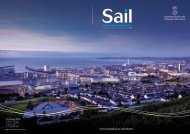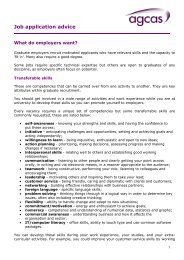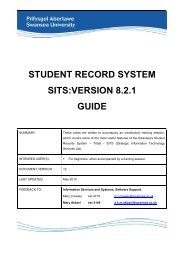Strategic Plan 2006 - Swansea University
Strategic Plan 2006 - Swansea University
Strategic Plan 2006 - Swansea University
You also want an ePaper? Increase the reach of your titles
YUMPU automatically turns print PDFs into web optimized ePapers that Google loves.
Aim Three – Streamlining the Governance<br />
and Administration Structure<br />
Aim Four – Management and Leadership<br />
Objectives for the <strong>Plan</strong>ning Period<br />
In pursuing its aim of Streamlining the<br />
Governance and Administration Structure,<br />
the <strong>University</strong> will seek to:<br />
. gain ‘<strong>University</strong>’ title.<br />
The <strong>University</strong> will address potential challenges with effective, proactive<br />
and inclusive leadership, informed by the views of staff throughout the<br />
organisation, in driving forward the <strong>University</strong>’s agenda.<br />
. respond to the Wigley Report<br />
implementation process.<br />
. review the <strong>University</strong>’s Charter and Statutes<br />
in the light of changes to the <strong>University</strong> of<br />
Wales’ structure.<br />
. prepare for the Institutional Review of<br />
2007/08.<br />
. develop some areas of administrative<br />
collaboration immediately, and scope<br />
others, as part of the tripartite South West<br />
Wales Higher Education Partnership bid.<br />
. implement the new arrangements regarding<br />
the European Directive on consultation in<br />
the workplace, negotiating with the<br />
relevant Unions.<br />
. continue to work with other Welsh HEIs to<br />
implement the necessary changes to Statute<br />
22, the <strong>University</strong>’s disciplinary procedures.<br />
. through Nominations Committee, and<br />
individual committees annual reviews<br />
of their performance, ensure that all<br />
committees provide added value to<br />
the <strong>University</strong>.<br />
. maintain central administration and services<br />
costs as a proportion of total income such<br />
that they continue to be lower (12.3% in<br />
2003/04) than the 94 Group average<br />
(13.1%) and the Welsh institutions<br />
average (13.1%).<br />
. continue to review the administration,<br />
through a well-established quality<br />
management system and the KPMG<br />
Report Working Group, to ensure it is<br />
efficient, and responsive.<br />
Approach<br />
A critical path of activities prior to the<br />
Institutional Review has been drawn up, and<br />
preparations will continue in <strong>2006</strong>/07. The<br />
IRWP will continue to meet, and has identified<br />
further areas to be considered for ‘thematic<br />
review’, which looks at processes as a whole to<br />
consider if they operate through all areas of the<br />
<strong>University</strong> coherently. A draft self-evaluative<br />
document will be drawn up, three Schools will<br />
undergo a Periodic Review, and information<br />
sessions for staff will also take place.<br />
The tripartite South West Wales Higher<br />
Education Partnership (SWWHEP) will submit<br />
a fully costed bid to the Reconfiguration and<br />
Collaboration Fund in September <strong>2006</strong> for<br />
a major reconfiguration of administrative<br />
functions in South West Wales HE. The<br />
co-operation within functions will take place<br />
through trilateral agreements in some areas,<br />
and bilateral agreements between the partners<br />
in others where the differences in institutional<br />
missions and systems are such that the degree<br />
and nature of collaboration and speed of<br />
implementation will vary. One aspect of the<br />
SWWHEP collaboration is degree quality<br />
arrangements. <strong>Swansea</strong> is currently overseeing<br />
Trinity College’s quality provision for<br />
undergraduate students as part of the ‘Interim<br />
Arrangements’ whilst the UoW is in transition.<br />
The <strong>University</strong> is already engaged in thorough<br />
preparations for the governance and quality<br />
implications of the changes anticipated earlier<br />
in this section. A Review Group has been<br />
established to consider the changes to the<br />
<strong>University</strong>’s Charter and Statutes that will be<br />
required following the move to a confederal<br />
<strong>University</strong> of Wales, implications of possible deregulation<br />
from certain aspects of direct control<br />
by the Privy Council, and actions in anticipation<br />
of a successful outcome to the application for<br />
<strong>University</strong> title. <strong>Swansea</strong> <strong>University</strong> will continue<br />
to work with other Welsh HEIs to implement the<br />
necessary changes to Statute 22, the<br />
<strong>University</strong>’s disciplinary procedures.<br />
Consultation will take place with the staff<br />
Unions during the implementation.<br />
Following discussion and review by a joint<br />
management and trade union working group<br />
set up to consider the impact of the Information<br />
and Consultation Regulations, the formal<br />
vehicle for management and union dialogue in<br />
the <strong>University</strong> will be the Staff Consultation<br />
Committee. The Committee’s remit will be the<br />
communication of information and consultation,<br />
taking account of the views of staff<br />
representatives before the <strong>University</strong> makes a<br />
formal decision. This approach provides a<br />
modern context for employment relations and<br />
will form a firm foundation for partnership and<br />
cooperation in the future.<br />
The <strong>University</strong> will continue to review its<br />
expenditure on administration on an ongoing<br />
basis through the year, as posts require<br />
replacement each request is reviewed by SMT.<br />
The SMT will also review the budgets of each<br />
administrative department annually, considering<br />
the demands upon them and the overall<br />
envelope of resource available. A KPMG Report<br />
Working Group, chaired by a Head of School,<br />
will work to unlock the longer-term efficiency<br />
savings identified in the KPMG report.<br />
Current Position<br />
On 1st September 2005, Sir Roger Jones OBE<br />
became the new Chair of Council. Sir Roger is<br />
the founder of Penn Pharmaceuticals, one of the<br />
world's leading pharmaceutical development<br />
companies, Chairman of the Welsh Industrial<br />
Trust, a former Governor of the BBC and<br />
Chairman of the BBC Broadcasting Council for<br />
Wales as well as past Chairman of both the<br />
Institute of Directors Wales, and the Welsh<br />
Development Agency.<br />
In support of the ambitious <strong>Strategic</strong> Directions<br />
agenda the Finance Department introduced a<br />
new business planning process in 2003/04 to<br />
facilitate planning, budgeting and resource<br />
allocation. It was viewed that this approach<br />
would incentivise academic areas by allowing<br />
them to bid for additional resources against<br />
increasing income, improve performance<br />
monitoring against financial and non-financial<br />
targets at strategic and School levels, and<br />
influence through a bottom-up planning process<br />
the <strong>University</strong>’s overall strategic targets and<br />
financial forecasts. The process has been<br />
refined, embedded and improved each year.<br />
Last year, in preparation for the 2005/06<br />
budget cycle, between March and June 2005<br />
every academic department produced a business<br />
plan. The outputs of these plans were presented<br />
to the SMT and underwent a test and challenge<br />
process. The results informed the setting of the<br />
<strong>University</strong>’s strategic output targets and resource<br />
allocation decisions. The aggregated figures are<br />
used to underpin the annual rolling five-year<br />
financial plan (for approval by the Governing<br />
Body) and for preparing financial forecasts for<br />
submission to the HEFCW.<br />
The process has taken place earlier this year<br />
with plans completed, and reviewed by SMT,<br />
in April <strong>2006</strong>. A significant amount of work<br />
has taken place to ensure that the changes that<br />
have been made to the <strong>University</strong>’s academic<br />
structure are reflected in the resourcing data<br />
Professor Richard B. Davies<br />
Vice-Chancellor<br />
Professor Rhys Williams<br />
Pro-Vice-Chancellor<br />
used in the plans, ensuring equity and<br />
accountability. Encouragingly, the process has<br />
already, through incentivisiation, encouraged<br />
departments to review their accommodation<br />
needs and shed space. This has freed up a<br />
scarce resource at minimal (basic refurbishment)<br />
cost to the <strong>University</strong>.<br />
Academic year 2005/06 saw the creation of<br />
a new support unit, the Department of Research<br />
and Innovation, which will strengthen and<br />
oversee the <strong>University</strong>’s knowledge transfer<br />
activities with business and industry. The<br />
Department incorporates all the activities and<br />
staff of the previous Research and Innovation<br />
Professor Peter Townsend<br />
Pro-Vice-Chancellor (Administration)<br />
Professor John Baylis<br />
Pro-Vice-Chancellor<br />
Professor Nigel Weatherill<br />
Pro-Vice-Chancellor<br />
Phillip Gough<br />
Director of Finance<br />
Office. This new, larger structure is made<br />
possible by external funding and will ensure the<br />
effective delivery of large, prestigious projects.<br />
The <strong>University</strong>’s success in obtaining significant<br />
external funds for these projects has made the<br />
bolstering of capacity in this area necessary to<br />
ensure that current standards of project<br />
management are maintained.<br />
12<br />
13


